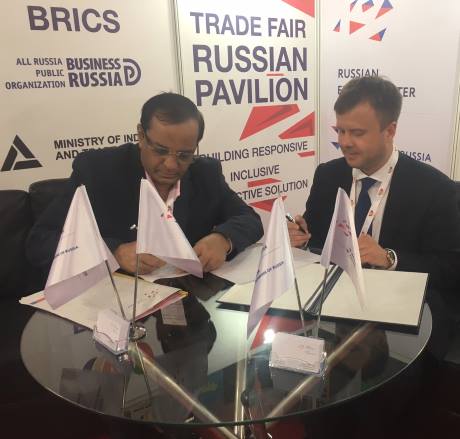Russia and India plan radiation treatment network
13 October 2016
Rosatom subsidiary United Corporation for Innovation LLC and the Indian Agricultural Association have signed an agreement on the development of "a network of integrated infrastructure centres" for radiation treatment in India. The agreement was signed today on the sidelines of the BRICS Business Forum in New Delhi by the Russian company's CEO, Denis Cherednichenko, and the chairman of the Indian association, Bharat Dhokane Pandurang.
 |
| Cherednichenko and Pandurang signing the agreement today in New Delhi (Image: Rosatom) |
Rosatom, the Russian state nuclear corporation, said in a statement the project "contemplates the stepwise establishment and development" of the network which is to be managed by a Russian-Indian joint venture.
"Radiation treatment of food products is one of various applications of state-of-the-art radiation technologies offered by Rosatom to its foreign partners. The use of this technology will make it possible to reduce the loss of onions in India, which currently go bad because of germination and inadequate storage, by 42,000 tons per year on average, as well as to reduce grain losses from 15% to 3-5% per year," Cherednichenko said.
The Rosatom executive noted that 22 countries are using about 515 radiation plants based on Russian technologies.
Pandurang said: "Russia has a wide experience in this field; it has also been our reliable partner for a long time, and we hope that this project will not only make us closer to the solution of global problems in the sphere of sustainable development, but will also help India to become a center of radiation technologies in the Asian region."
The first stage of cooperation will include construction and commissioning of seven radiation treatment centres in India.
Rosatom said: "Within the framework of bilateral cooperation, it is considered acceptable to extend a network of integrated infrastructure irradiation centers in the UAE, the Republic of Mauritius and Malaysia".
It added: "Irradiation doses are recommended by the International Atomic Energy Agency and the final product is absolutely safe. Irradiation does not reduce the nutritional value of food products and does not change their organoleptic properties and appearance."
United Innovation Corporation was created as a Rosatom subsidiary in 2011. Its areas of expertise include nuclear medicine, multifunctional centres for radiation treatment and environmental protection.
Researched and written
by World Nuclear News